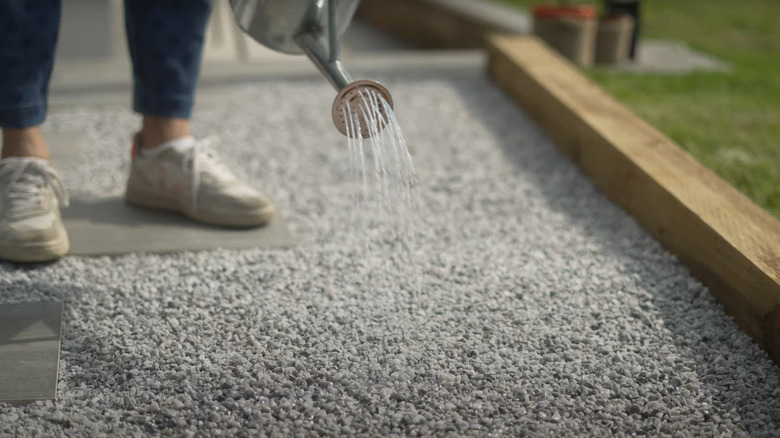We may receive a commission on purchases made from links.
While resin is a popular choice for various unique crafts, you may have also heard of people using it outdoors — but is it safe to do so? Although there are resin-based products on the market, each one of them is different, and it’s not always clear what type of resin they include. This, paired with a lack of scientific research into whether pour-on resin is safe for the environment, makes it challenging to determine what its effects on the ground and soil would be, especially long-term.
A study by the British Dental Journal suggested that resin-based composite materials “have the potential to act as environmental pollutants as a consequence of their breakdown and subsequent elution.” While that study was regarding resin-based composites used in the dental industry, it casts doubt on the sustainability of using any resin products in the ground. Those who are concerned about the unknown long-term effects of resin may want to avoid these products.
However, those who are unconvinced of the dangers resin may present can lower their environmental impact by using a water-based urethane resin, such as Easihold, which claims it is not harmful. Also, avoid using it where a lot of people walk all the time. Although you may feel it is unlikely, the surface could cause a slip, especially with younger children running around, making it a potential safety hazard. On a superficial level, heavy foot traffic could loosen your finish and the color may wane over time depending on which product you opt for.
Choose a resin product with care
#gardenproject #resin @easihold #gardeninghacks #gardenmakeover #diygarden #gardengoals
♬ Walking On Sunshine (25th Anniversary) [2010 Remaster] – Katrina and the Waves
Watch on TikTok
If you’d like to use resin to keep garden stones in place, you’ll first need some specifically made for the task. One option is Easihold from Amazon for $69.99, a popular and highly rated product that is UV-stable. Another option is Gravel-Lok for $213.74 from Paramount Materials, which is polyurethane-based, or some mulch glue, for an environmentally friendlier option. Just make sure that you choose one that works with the materials you’re using it on, as there are many different gravel types to consider. You’ll also want a watering can and some landscaping fabric to provide a barrier between the resin and the ground. Another protective option instead of landscaping fabric would be to use a thin layer of concrete and let it set, but keep in mind this still may have a small environmental impact.
Once you have everything, you’ll need to dress appropriately for the job. You’ll need gloves, goggles, and an appropriate respirator for the fumes. When you’re ready, you can put some resin into your watering can and apply it over the top of your gravel, providing that it’s dry outside and not too chilly. When it’s fully cured, it’s perfectly safe to be around. As a result, you should be left with gravel that sits firmly in place rather than spraying everywhere, which can help you create a functional front lawn. If you’re using another product such as the mulch glue, simply follow the product’s instructions.
Resin can negatively impact the environment

VubaResinProducts/YouTube
While each product is different, even ones that are labeled “water-based” or “non-toxic” could still potentially be harmful to nature. For example, the Easihold resin safety data sheet warns users to keep it away from soil and waterways, per Vuba Resin Products, which highly suggests that it might harm the environment. This would make sense, as a safety guide from AeroMarine Products also outlines that epoxy resin can put ecosystems and marine life in danger, so anything living in your soil may succumb to the same impact, especially as pour-on resin comes in a liquid state. However, there are no scientific studies for pour-on gravel products specifically.
Likewise, the fumes of the resin can make it potentially unsafe, hence why it’s so important to take precautions and avoid it during the hardening process. This is because the fumes from the resin have the potential to trigger headaches, agitate your lungs and skin, encourage asthma, and even impact your nervous system, per the California Department of Public Health. For these reasons, you must take the correct safety measures, both during and after you use it until it’s cured. Even if you think being outdoors may help, you should still follow precautions to avoid any vapors, such as wearing a respirator.